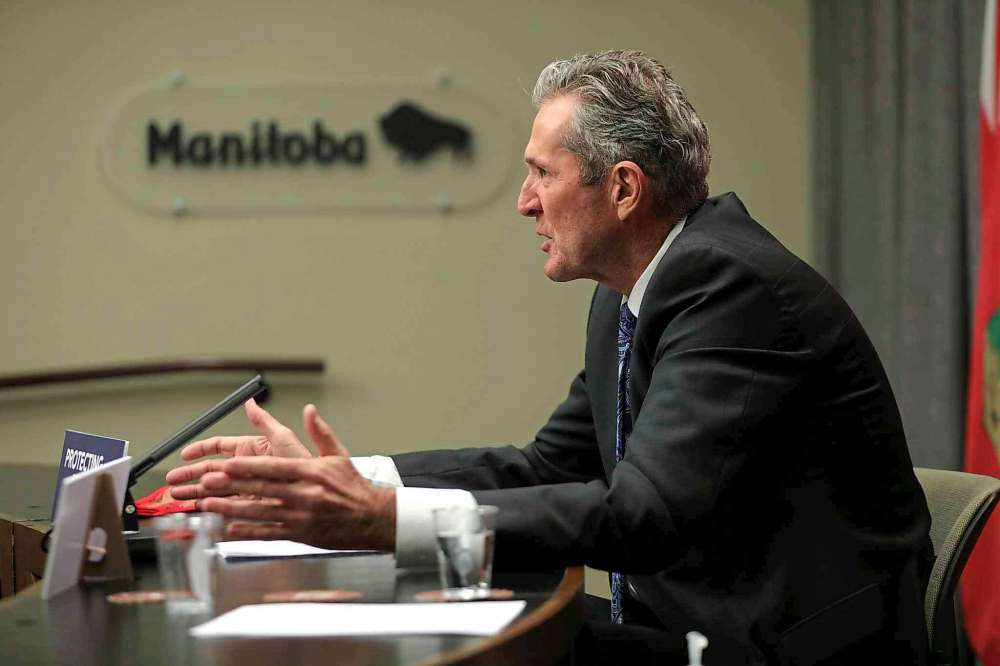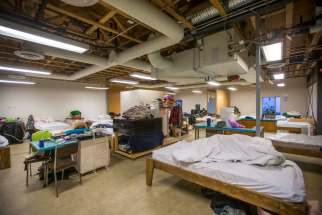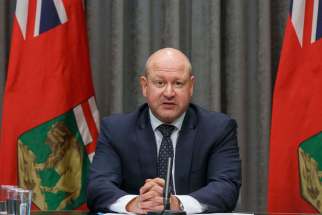Manitoba critical care unit workers first up for vaccine
Read this article for free:
or
Already have an account? Log in here »
To continue reading, please subscribe:
Monthly Digital Subscription
$1 per week for 24 weeks*
- Enjoy unlimited reading on winnipegfreepress.com
- Read the E-Edition, our digital replica newspaper
- Access News Break, our award-winning app
- Play interactive puzzles
*Billed as $4 plus GST every four weeks. Offer only available to new and qualified returning subscribers. Cancel any time.
Read unlimited articles for free today:
or
Already have an account? Log in here »
Hey there, time traveller!
This article was published 09/12/2020 (1546 days ago), so information in it may no longer be current.
Critical care workers tending to the most seriously ill Manitobans with COVID-19 are to be first in line to be immunized with the long-awaited vaccine, when it arrives in the province as early as next week.
Premier Brian Pallister said the first batch of 1,950 doses of the Pfizer Inc.-made vaccine supplied by Ottawa will be used to protect about 900 health workers with the required two doses each.
Further vaccine shipments are expected to arrive later this month or in early January. In total, Manitoba has been told it will receive 228,000 doses of the Pfizer and Moderna Inc. vaccines between now and the end of March.
That will be enough to protect more than 100,000 Manitobans, or about seven per cent of the province’s population.

“Manitoba is about to embark on a vaccine campaign that will likely be a unique one in all of our lifetimes,” chief provincial public health officer Dr. Brent Roussin said Wednesday.
The province’s vaccine team completed “a successful dry run” Tuesday at the temporary site in Winnipeg where the initial doses will be delivered.
“We know health-care workers are at a greater risk (of getting COVID-19), and we need to protect them to protect our health-care system,” Roussin said.
“Manitoba is about to embark on a vaccine campaign that will likely be a unique one in all of our lifetimes.”
– Dr. Brent Roussin
In addition to health-care workers most directly involved in the pandemic response, those given top priority in the next few months will include seniors living in long-term care facilities, retirement facilities and chronic care hospitals; adults aged 80 and older; and adults at risk in remote or isolated Indigenous communities.
Over the next three months, more permanent vaccination clinics are to open in Winnipeg, Brandon, Thompson, Steinbach, Gimli, Portage la Prairie, and The Pas.
“We’re ready. We’re recruiting people to lend their skills to a vaccine campaign starting today,” Roussin said. “We’re procuring all the supplies needed to get needles into arms.”
More than 60 freezers of varying specifications have been procured or allocated to the province to meet the stringent storage needs of the two new vaccines. By January, the province will have the capacity to safely store more than 1.8 million doses.
While officials were clearly excited Wednesday to trumpet news of the imminent arrival of a COVID-19 vaccine, they took great pains to remind Manitobans immunization will still be a slow process. The goal is to vaccinate any Manitoban who wants it by the end of 2021.
“We cannot let our guard down. The cavalry isn’t here yet, and we have to make sure that we’re defending one another every day,” Pallister said, referring to the need for Manitobans to continue to obey public health orders and guidelines.
Roussin said “well over 60 per cent” of Manitobans will need to be vaccinated before the populace achieves any kind of herd immunity to the novel coronavirus. He urged members of the public to go for their shot as early as they are able.
“We cannot let our guard down. The cavalry isn’t here yet, and we have to make sure that we’re defending one another every day.”
– Premier Brian Pallister
A cross-government task force is engaged in the complex logistical effort to immunize the population. Details on who is vaccinated where and when will be provided in the weeks and months ahead.
“The scope of this work is unlike anything most of us will ever experience again,” Roussin said. “We have taken the time to get it right, and we’re ready for this campaign.”
In the short term, however, the main limiting factor in the effort is expected to be supply. Shipments of the vaccine are likely to arrive in small batches at first, officials said.
Manitoba NDP Leader Wab Kinew welcomed the news of the vaccine’s imminent arrival and encouraged the government to launch “a really strong” advertising campaign to promote immunization, targeting those who might be unsure on whether to get their shots.
“Now is time to put up billboards… Now is the time to get the message out,” he said. “There is going to come a time and place where we’re going to hit that wall of vaccine hesitancy, and we need to have a plan to overcome it.”
Noting the public’s worry and anxiety about COVID-19, Liberal Leader Dougald Lamont urged the government to inform the public about its vaccine roll-out plans as decisions are made.
“This information is a priority and it needs to get out as quickly as possible.”
— with files from Danielle Da Silva
larry.kusch@freepress.mb.ca

Larry Kusch
Legislature reporter
Larry Kusch didn’t know what he wanted to do with his life until he attended a high school newspaper editor’s workshop in Regina in the summer of 1969 and listened to a university student speak glowingly about the journalism program at Carleton University in Ottawa.
Our newsroom depends on a growing audience of readers to power our journalism. If you are not a paid reader, please consider becoming a subscriber.
Our newsroom depends on its audience of readers to power our journalism. Thank you for your support.
History
Updated on Wednesday, December 9, 2020 1:59 PM CST: Adds photo
Updated on Wednesday, December 9, 2020 5:52 PM CST: Full write through of earlier version.
Updated on Wednesday, December 9, 2020 6:06 PM CST: Adds photos and pullquotes.











